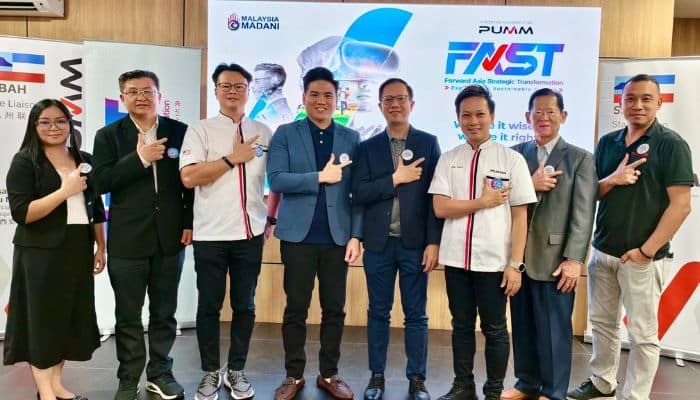Kuala Lumpur, Malaysia – Persatuan Usahawan Maju Malaysia’s (PUMM) Forward Asia Strategic Transformation (FAST) has continued its momentum in Kota Kinabalu, bringing together leaders from both public and private sectors. For this new engagement, FAST’s objective is to highlight how collaboration can protect the environment while scaling Malaysia’s economy and sustainability efforts in tandem.
FAST noted that as environmental threats become increasingly urgent, from climate disruption to resource scarcity, the call for responsible and forward-thinking business practices has never been louder.
The session began with a welcome speech by Patrick Chiam, PUMM Sabah State Chairman, who emphasised the importance of unity and purpose in today’s business landscape, stating “Businesses need to work together and build a better community. Only then can we move forward and create a truly sustainable way of living.”
With the event centering on the theme “Environmental Protection: How Government Policies, Technology, and Entrepreneurs Play a Role”, the panel included:
- Amos Thien, Ministry of Industrial Development and Entrepreneurship Sabah
- Dato’ George Lim, Founder, GA Group
- Saila Saidie, Specialist in Waste Management and Recycled Products
- Deric Chiew, Director, CK Ecosystem
The forum was moderated by Yens Chong Yen Kai, PUMM Central Committee Member and Initiator of the FAST Movement. Together, the panel explored ways in which policy, innovation, and entrepreneurship can work hand in hand to advance Malaysia’s sustainability goals.
“Sabah should explore manufacturing investments in the green sector. One growing global demand is copper foil, which is used in electric vehicle battery production,” shared Amos Thien.
“Green knowledge must be accessible to everyone. It shouldn’t be kept as a trade secret, but shared openly so more can apply it in their businesses,” urged Dato’ George Lim.
“We’re seeing a growing industry for turning waste into second-life products. But especially in Sabah, we need stronger public education to build understanding and acceptance,” noted Saila Saidie.
“Whether you’re a business or an NGO, you must start by working on the solution. Real action leads to traction, credibility, and eventual support from government and stakeholders,” said Deric Chiew.
Following the panel, Yens Chong Yen Kai, who also serves as the Organising Chairman of FAST, reinforced the movement’s purpose.
“In today’s fast-paced economy, businesses must integrate ESG and AI not just as checkboxes, but as the new core of their operating model. ESG gives your business purpose and clarity, while AI drives speed and scalability. When embraced together, they help build a brand that is responsible, agile, and future-ready.”
Two additional keynote sessions brought deeper insight to the evening:
- Michael Lim presented “Energy Efficiency for Business”
- Thomas Lim shared “ESG: Beyond Compliance”
“Climate change is rooted in our everyday habits. We don’t need superheroes; we just need more people doing their part. That alone can significantly reduce energy use and greenhouse gas emissions,” said Michael Lim.
“ESG is not just about ticking boxes. It’s about reprogramming how a company thinks, grows, and makes an impact,” emphasized Thomas Lim.
With 15 high-impact sessions happening across Malaysia in 2025, this event journey builds up to the FAST Flagship Summit on 27 November 2025 in Kuala Lumpur—an ASEAN-level convergence of changemakers, thought leaders, and entrepreneurs who are ready to lead the next chapter of sustainable business in Asia.


